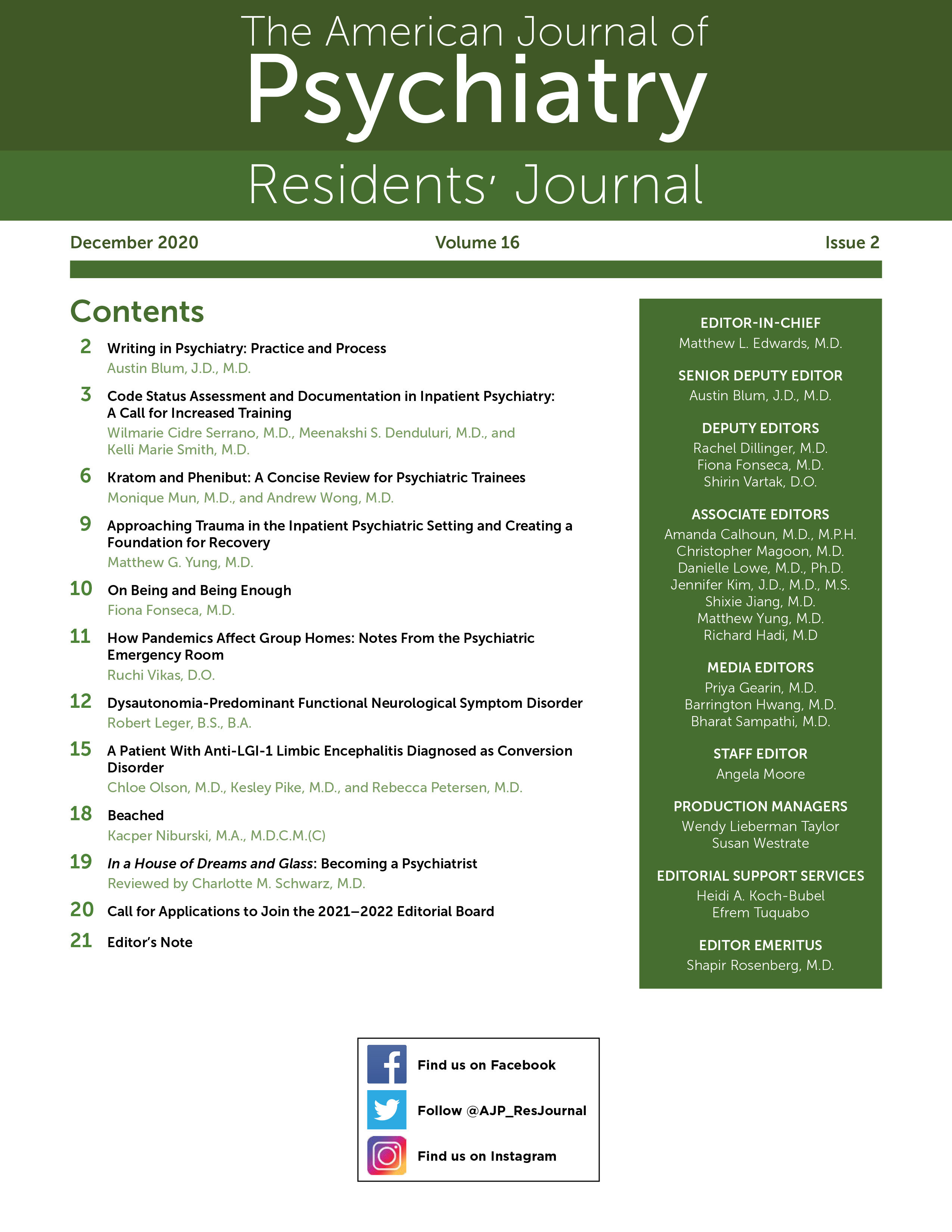It was our first month of residency, and we were gathered for a foundational didactic on the psychiatric interview. Our instructor asked us to write a few words about a potential patient who might cause us dread, and a common theme emerged. We were all concerned that we might somehow not be enough for our patients: helpful enough, skillful enough, knowledgeable enough. I looked down at my own slip of paper, where I had hastily scrawled "Big, angry, loud patient." Although self-preservation played a role in my response, I also feared that my urge to escape might shut me down, outweighing my ability to remain present with my patient.
Further contributing to this response was my acute awareness that I was starting residency exhausted. As an international medical graduate several years from graduation, I had filled the years before residency with everything I could do to make myself a "good enough" candidate for residency, stifling my emotional experiences along the way in order to keep pushing through every hurdle. The need to authentically reconnect with my everyday experience rather than being swept up by future-focused anxiety brought me back to the practice of vipassana, a form of insight meditation.
Vipassana focuses on the mind-body connection and offers me a way to be genuinely present with myself. This difficult practice teaches me to develop mindfulness and equanimity, both on the cushion as well as in everyday life, which then translates to my clinical work. The quality of the presence I am able to offer someone else is a function of the quality of presence I am capable of offering myself. By learning to become comfortable with my own discomfort and even pain, I am able to accept my experience of the clinical moment and bring a sense of quiet confidence to the interview room.
The nature of our profession demands a certain level of ease with our patients’ distress. However, it is simply human to experience discomfort when another is in distress. By becoming more accepting of the discomfort that my patient’s distress has generated within me and by engaging the awareness and equanimity that my vipassana practice has given to me, I am able to model acceptance of emotional distress to my patient. Learning through this example, my patients may temper their response to discomfort and feel subsequently safer in exploring emotions, gently uncovering their underlying feelings, thoughts, and needs. There is hope that in time, my patients too can develop some sense of ease in dealing with the turbulence of their mind, meet themselves, and heal.
During my last week as a second-year resident, I met exactly the sort of patient I dreaded meeting during my first month of residency. My patient was tall, loud, angry, and incredibly vulnerable, despite wearing the bold mask of a full-blown manic episode. While reflecting his feelings—you are angry, you are afraid—I was able to acknowledge my heart racing, my skin crawling, my shallow breathing. Paradoxically, without changing these uncomfortable feelings, I was more accepting of my own vulnerability and more comfortable with being assertive and standing tall. The feelings evoked by his and my own emotions started losing their power over me. I was able to stay present with my experience and with my patient.
Meditation offers a transformative experience that transcends yet sustains my clinical training. It is a similarly challenging, deeply personal, humbly rewarding, nonlinear exercise in understanding, which fills me with an unfathomable sense of gratitude. Each meditation session is as uniquely different in much the same way as every patient encounter is different, and I am constantly beginning the important work of fully meeting myself in all my experiences. Although maintaining a consistent meditative practice is challenging, especially as a busy resident, with everyday life and ordinary human imperfection getting in the way, my persistence in cultivating this habit somewhat parallels my patients’ journeys of recovery from mental illness. Through this process, I am starting to live more fully, becoming a more empathetic, effective clinician and learning to be truly present with my patients in a way that is "enough."
